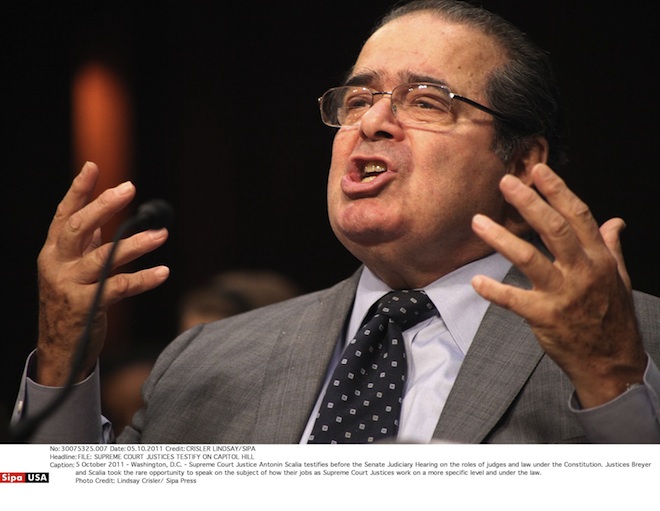In his aggressive defense of Arizona’s immigration law, Justice Antonin Scalia pointedly went after President Obama’s recent immigration policy shift and accused him of deliberately refusing to enforce immigration statutes.
Justice Scalia wrote a 22-page barnstorming dissent against the court’s 5-3 decision Monday which found major provisions of S.B. 1070 violate the Constitution. The conservative jurist accepted the premise that the federal government has supremacy on immigration, but declared that the Arizona law is “in complete compliance” with federal statutes.
In his point-by-point defense of the Arizona legislation, the avowed law-and-order conservative surmised that the Obama administration “desperately wants to avoid upsetting foreign powers.” He accused federal officials of “willful blindness or deliberate inattention” to the presence of illegal immigrants in Arizona.
“[T]o say, as the Court does, that Arizona contradicts federal law by enforcing applications of the Immigration Act that the President declines to enforce boggles the mind,” Scalia wrote. “If securing its territory in this fashion is not within the power of Arizona, we should cease referring to it as a sovereign State.”
The Reagan-appointed justice wrote:
It has become clear that federal enforcement priorities–in the sense of priorities based on the need to allocate “scarce enforcement resources”–is not the problem here. After this case was argued and while it was under consideration, the Secretary of Homeland Security announced a program exempting from immigration enforcement some 1.4 million illegal immigrants under the age of 30.
[For certain illegal immigrants] immigration officials have been directed to “defe[r] action” against such individual “for a period of two years, subject to renewal.” The husbanding of scarce enforcement resources can hardly be the justification for this, since the considerable administrative cost of conductÂing as many as 1.4 million background checks, and ruling on the biennial requests for dispensation that the nonenforcement program envisions, will necessarily be deducted from immigration enforcement. The President said at a news conference that the new program is “the right thing to do” in light of Congress’s failure to pass the Administration’s proposed revision of the Immigration Act. Perhaps it is, though Arizona may not think so. But to say, as the Court does, that Arizona contradicts federal law by enforcing applications of the Immigration Act that the President declines to enforce boggles the mind.
Scalia enlisted bubble-gum to make his point, before calling it an “assault on logic” to say “identifying a removable alien and holding him for federal determination” supersedes the federal government’s authority.
“We are not talking here about a federal law prohibiting the States from regulating bubble-gum advertising, or even the construction of nuclear plants,” he declared. “We are talking about a federal law going to the core of state sovereignty: the power to exclude.”
Adam Winkler, a constitutional law professor at UCLA, pushed back on Scalia’s argument.
“Scalia has finally jumped the shark,” Winkler told TPM. “He claims to respect the founding fathers, but his dissent channels the opponents of the Constitution. Back then, opponents argued that the Constitution denied states their sovereignty by giving too much power to the federal government, as with immigration. Now Scalia echoes their complaints that states are being denied their sovereignty. States are not sovereign when it comes to powers vested in Congress, such as the authority over immigration and naturalization.”
Added Scalia: “What I do fear–and what Arizona and the States that support it fear–is that ‘federal policies’ of nonenforcement will leave the States helpless before those evil effects of illegal immigration that the Court’s opinion dutifully recites … but leaves unremedied in its disposition.”
Read the court’s opinions, including Justice Scalia’s dissent.






